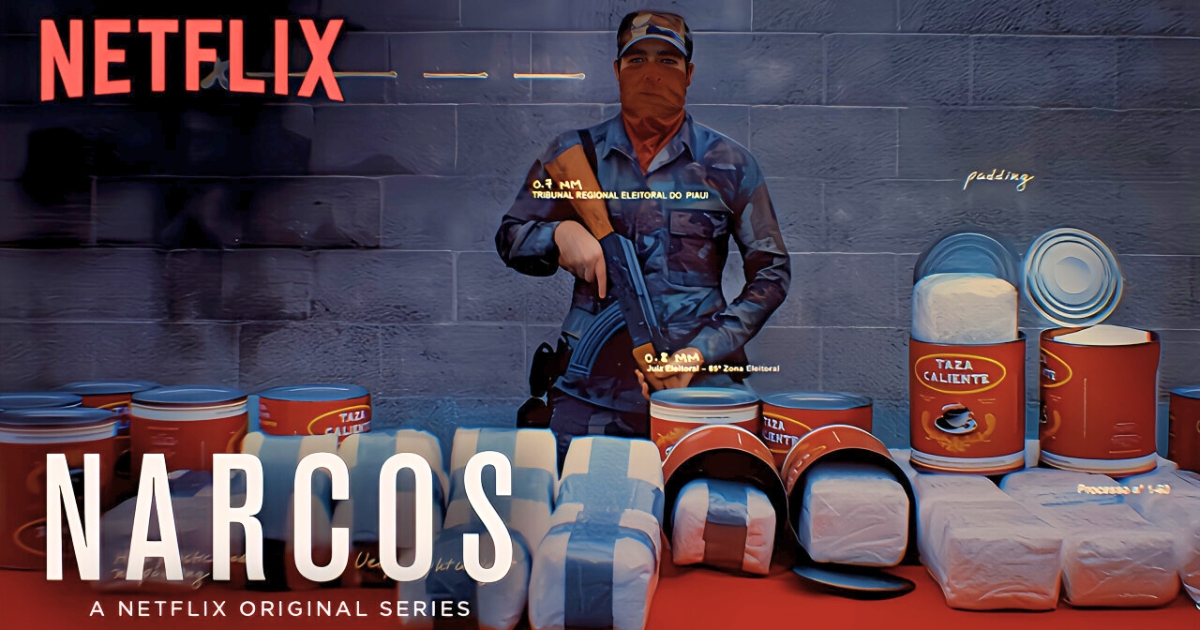Netflix’s original series, “Narcos,” is an addictive crime drama that immerses viewers in the world of drug cartels, their rivalries, and their relentless power struggles. Blending a story based on real events, complex character dramas, and gripping action, “Narcos” is one of Netflix’s most acclaimed series. If you haven’t seen it yet, dive into the world of “Narcos” with this review.
Season 1: The Rise of Pablo Escobar, the Man Who Changed Colombia
In the late 1970s, in Colombia, a man named Pablo Escobar (Wagner Moura) rises from poverty to amass immense wealth through cocaine smuggling. He quickly becomes a dominant force in the country’s economy and politics. Escobar’s charisma and ruthlessness both terrify and fascinate, making him a hero to some in the impoverished population.
Escobar’s meteoric rise brings significant changes to Colombian society. He earns popular support by providing aid to the poor and building housing, filling a void left by the government. However, behind the scenes, he ruthlessly eliminates rivals and expands his drug empire.
Season 1 carefully portrays Escobar’s complex character. He’s a devoted family man, yet capable of cold-blooded business decisions and merciless actions toward his enemies. This nuanced portrayal evokes conflicting emotions in viewers: disgust, empathy, fear, and even a twisted admiration for Escobar.
Meanwhile, DEA agents Steve Murphy (Boyd Holbrook) and Javier Peña (Pedro Pascal) are sent to Colombia to capture Escobar. But with local police and politicians on Escobar’s payroll, their investigation faces immense challenges.
Murphy and Peña’s struggles unfold alongside Escobar’s story, offering viewers the perspective of those fighting for justice. However, they too face ethical dilemmas as they grapple with Escobar’s overwhelming influence, which often operates outside the bounds of the law.
Season 2: A Cornered Kingpin and a Desperate Escape
Escobar’s power reaches its peak, but so does the pressure from the U.S. government, and his relationship with the Colombian government deteriorates. With his life in danger, Escobar embarks on a harrowing escape to protect his family, his associates, and his empire.
This season delves into Escobar’s family ties and the complex relationships with his loyal companions. His bond with his wife, Tata (Paulina Gaitan), and brother, Gustavo (Juan Pablo Raba), highlights his more human side.
During his time on the run, Escobar’s mental state becomes increasingly unstable. The show skillfully depicts his loss of composure and sound judgment. Simultaneously, those around him wrestle with loyalty and betrayal, adding depth to the narrative.
Season 2’s relentless tension keeps viewers on the edge of their seats.
Season 3: The Shadow of the Cali Cartel, and the Start of a New War
After Escobar’s death, the Cali Cartel emerges as the new rulers of Colombia’s drug trade. Unlike Escobar’s violent methods, they expand their operations with a business-like approach. The DEA sets out to dismantle this new enemy, but the Cali Cartel’s sophisticated and resilient organization proves a formidable challenge.
Season 3 follows the intertwining ambitions of Cali Cartel leaders Gilberto Rodriguez (Damian Alcazar), Miguel Rodriguez (Francisco Denis), and Pacho Herrera (Alberto Ammann), as a new power struggle unfolds.
The Cali Cartel’s refined business model presents the DEA with a different kind of challenge than Escobar. The cartel’s tactics go beyond bribes and threats, employing sophisticated methods like money laundering through legitimate businesses, keeping investigators on their toes.
This season also exposes the deep roots of the drug trade in politics and economics. Viewers witness the collusion between the cartel and government officials, as well as the exploitation of international financial systems for money laundering, revealing the complexity and depth of the drug problem.
The Story Continues in “Narcos: Mexico”
While “Narcos” concludes with Season 3, the story continues in the spin-off series “Narcos: Mexico.” Be sure to check out this continuation, which explores a new chapter in the drug war, set in Mexico.
“Narcos: Mexico” delves into the rise of Mexican drug cartels and the DEA’s efforts to combat them. It offers a realistic portrayal of the drug war in a different geographical and political context than Colombia.
In Conclusion: Shocking Truths You’ll Only Find on Netflix
“Narcos” is a profound series that not only realistically portrays the dark world of drug cartels but also exposes human desires, love, hate, and societal contradictions. It goes beyond being a simple crime drama, delving into social issues and the depths of human nature, leaving viewers with many questions to ponder.
For example, how do poverty and inequality breed crime? Where does the corruption of power begin? And to what extent can law enforcement uphold “justice”? While the series doesn’t offer clear answers, it provides a catalyst for individual reflection.
One of the show’s strengths is its basis in real people and events. While fictionalized, its commitment to historical accuracy adds credibility and weight to the story.
The performances in “Narcos” are also exceptional. Wagner Moura’s portrayal of Pablo Escobar, in particular, garnered an Emmy nomination. His charismatic performance masterfully captures the complexity of Escobar’s character.
With its overwhelming realism, suspense, and profound character drama, “Narcos” draws viewers into the heart of the drug war. Experience this shocking drama, exclusive to Netflix, for yourself. It’s a journey that goes beyond mere entertainment, delving into the darkness of modern society and the essence of human nature.


